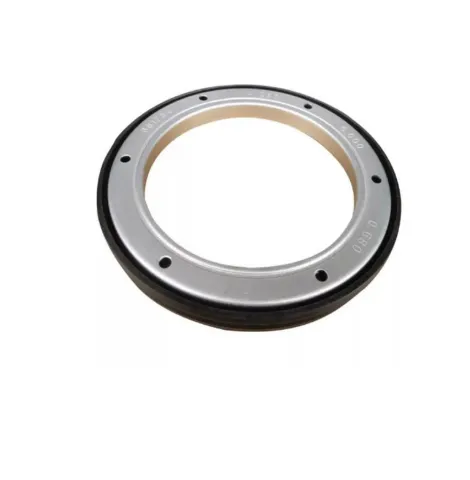A Deep Dive into Oil Seal Technologies: From V Ring Seals to Teflon and Felt Options
Oil seals are essential components in industrial, automotive, and agricultural machinery, ensuring smooth operation by preventing lubricant leakage and keeping contaminants out. As machinery designs become more complex, the demand for specialized seals grows. This article explores five key types of oil seals: V ring seals, oil ring seals, Teflon oil seals, TCM oil seals, and felt oil seals, highlighting their functions, benefits, and common applications.

Versatile Protection with V Ring Seals and Oil Ring Seals
V ring seals are unique, all-rubber seals designed to function as axial face seals. They are mounted directly on the shaft and rotate with it, sealing against a perpendicular surface (usually a bearing housing or cover). V rings are highly flexible and are used primarily to exclude dirt, water, and other contaminants, while also containing lubricants in some applications.
Key Features of V Ring Seals:
Made from flexible elastomers (usually nitrile or Viton)
Easy to install—stretch-fit onto the shaft
Dynamic sealing with low friction
Excellent dirt, dust, and splash water exclusion
Common Uses:
Electric motors
Agricultural equipment
Conveyor systems
Automotive components
In contrast, an oil ring seal typically refers to seals that retain oil in rotating machinery, especially in engines, gearboxes, and pumps. These are more traditional radial lip seals that sit between rotating shafts and stationary housings, providing a consistent barrier to oil leaks.
Benefits of Oil Ring Seals:
Prevent leakage of lubricants like oil and grease
Protect internal parts from external contaminants
Often include garter springs for better sealing force
Available in single and double lip styles
Both V rings and oil ring seals play essential roles in maintaining lubrication and protecting components, though their design and method of operation differ significantly.
Teflon and TCM Oil Seals: Precision and Performance
Teflon oil seals, made from polytetrafluoroethylene (PTFE), are designed for high-performance environments. Teflon is known for its exceptional chemical resistance, low friction, and high-temperature tolerance, making these seals ideal for demanding industrial and automotive applications.
Advantages of Teflon Oil Seals:
Withstand temperatures up to 250°C (482°F)
Resist aggressive chemicals and fuels
Provide long service life in high-speed or dry-running conditions
Minimize shaft wear due to low friction
Teflon oil seals are often used in:
Turbochargers
Chemical pumps
Automotive transmissions
Aerospace equipment
TCM oil seals, produced by TCM Corporation (now part of NOK), are well-regarded for their precision engineering and quality materials. TCM seals are used worldwide in OEM applications and offer various seal types, including:
Radial lip oil seals
Rotary shaft seals
Hydraulic seals
Why Choose TCM Oil Seals:
Manufactured to tight tolerances for reliable sealing
Available in metric and imperial sizes
Suitable for automotive, industrial, and agricultural applications
Supported by a global distribution network
When choosing between standard rubber, Teflon, or a trusted brand like TCM, consider the application's pressure, temperature, chemical exposure, and speed requirements.
Felt Oil Seals: Traditional Yet Effective in Low-Speed Applications
Felt oil seals are among the oldest types of shaft seals, made from compressed wool fibers or synthetic felt. These seals operate primarily through capillary action and physical blockage, absorbing oil to form a lubricated barrier while blocking out dirt and debris.
Key Characteristics of Felt Oil Seals:
Low cost and simple to manufacture
Excellent dirt exclusion in dry, dusty environments
Good compatibility with grease-lubricated systems
Non-metallic and non-sparking, suitable for specific industrial settings
Common Applications:
Vintage vehicles and machinery
Agricultural equipment
Electric motors
Low-speed gearboxes
While not ideal for high-speed or high-pressure applications, felt oil seals continue to be used where cost-efficiency, simplicity, and dirt exclusion are top priorities. They are often custom-cut or formed to fit a specific shaft or housing configuration.
Understanding the differences among V ring seals, oil ring seals, Teflon oil seals, TCM oil seals, and felt oil seals is essential for selecting the right sealing solution. Each type has a specific role and set of advantages depending on operating conditions:
V ring seals excel at dirt and splash exclusion in dynamic shaft applications.
Oil ring seals offer reliable lubrication retention in engines and gearboxes.
Teflon oil seals handle extreme environments where other seals might degrade.
TCM oil seals combine brand reliability with versatile industrial use.
Felt oil seals remain a practical choice for low-speed, dirt-prone conditions.
By evaluating shaft speed, temperature, lubricant type, and environmental exposure, maintenance teams and engineers can make informed choices that extend equipment life and reduce costly breakdowns.
-
Seal 12x20x5: Precision Radial Shaft Seals for Industrial Reliability
Aktualności Nov.24,2025
-
Seal 12x18x5: Essential Guide to Specifications, Applications & Vendors
Aktualności Nov.24,2025
-
Understanding Seal 12 20 5: Applications, Specifications & Industry Insights
Aktualności Nov.23,2025
-
Durable Oil Seal 85x110x12 – Reliable Sealing Solutions for Industry
Aktualności Nov.23,2025
-
Durable and Precise Oil Seal 75x95x10 for Efficient Machinery | YJM Seal
Aktualności Nov.22,2025
-
Durable Oil Seal 75x100x10 for Reliable Industrial Performance | YJM Seal
Aktualności Nov.22,2025
-
High-Quality Oil Seal 65x90x10 | Durable & Reliable Sealing Solutions
Aktualności Nov.22,2025
Kategorie produktów















